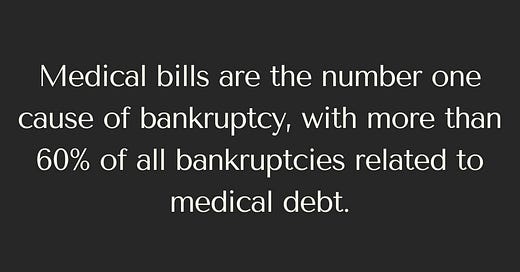What did we (my husband, a Psychiatry Resident, our friend, an ICU Nurse, and I) talk about at dinner on Friday? Among other things, the cost of medical care in the US.
As people who care for patients, they knew less than I did about insurance and the cost of different procedures. Our friend told us how he learned that this standard procedure that he does almost every day and takes about 20 minutes costs over $3000. They both were astounded and confused about how it was going to be so expensive for us to deliver our baby at the hospital in a few months (I am estimating about 10k out-of-pocket for prenatal care and the birth - and that’s with pretty good insurance).
The medical system, especially its finances, is unnecessarily veiled and confusing to many involved. Patients are left with the short end of the stick dealing with thousands of dollars in bills. In fact, medical bills are the number one cause of bankruptcy, with more than 60% of all bankruptcies related to medical debt.*
I listened to several interviews lately and bought and read Dr. Virgie Bright Ellinton’s book, What Your Doctor Wants You to Know to Crush Medical Debt, to get a handle on this situation personally.
https://affordanything.com/466-how-to-handle-medical-bills-with-dr-virgie-ellington/
https://podcast.moneywithkatie.com/how-to-erase-medical-debt-avoid-overpaying/
I was doing many things right, but I learned many scary facts (up to 90%! of medical bills contain errors) and a few new tricks. I want to share a complication of them here so that next time, I can refer back to it (and maybe you can, too).
Sign up for the right plan (reminder it’s still open enrollment!). Do you qualify for subsidized healthcare? (We miss the cut-off by a mere $100 per month). Is using COBRA more cost-effective than buying a plan from the healthcare marketplace? What plans does your employer offer?
Know your plan. Check before you get care for what is covered by your plan, what limits there are, what your deductible is, and what your out-of-pocket maximum is. If something is denied, check again and see if this might be the reason.
Get pre-authorization for procedures. It sounds ridiculous, but in the New Year, I am going to call our insurance and get pre-authorization for being admitted to the hospital to give birth. You can do the same for any test or procedure you have planned.
Don’t sign or pay anything until you verify the bills and the services. Usually, if using insurance, you get a bill in the mail about a month after you go to the doctor. I always check that everything on the bill makes sense (see below) and matches my EOB (Explanation of Benefits) from the insurance company. I don’t pay anything until I verify that.
Find mistakes in your bills. The first thing to do here is to ensure you have a real, itemized bill (one with codes for each charge called CPT code). Those codes can be Googled to tell you precisely what you are being billed for. Using that bill, you can check that everything makes sense and look for common mistakes, such as duplicates, incorrect length of stay at the hospital, etc.
Ask questions. I like to call and say, “I don’t understand X.” Rarely does someone answer the question on the first try, but it has happened. I keep detailed notes and save all the emails I send so I can refer back to them when I call again and use them if I need to escalate the problem.
Contest insurance denials. If the insurance denies a claim that I think should be covered, after rechecking the benefits, I will try to get them to overturn that. I might need to get the doctor involved to write a note, but it’s worth the headache to save the money (or get it to apply to my deductible).
Negotiate your bills. I can’t wait to try this one. If the hospital bill for the birth comes in at more than I estimated - you bet I am going to try to negotiate it down to what I have set aside. If they don’t accept less, I will ask for an interest-free payment plan.
Write off your medical bills on your taxes. Medical bills (including dental) over 7.5% of your adjusted gross income can be deducted from your taxes (if you take itemized deductions). This is something I will be keeping in mind this tax season.
Pay your medical bills last. Pay for your house, your car, your groceries, your medications, and all the essentials before you pay your medical bills. Only put your medical bills on your credit card if you can pay it off fully (you lose a lot of protections that way).
Hopefully, things will get less, rather than more complicated, but at least with some information, I feel ready for whatever bill gets thrown my way.
*Stats taken from What Your Doctor Wants You to Know to Crush Medical Debt




